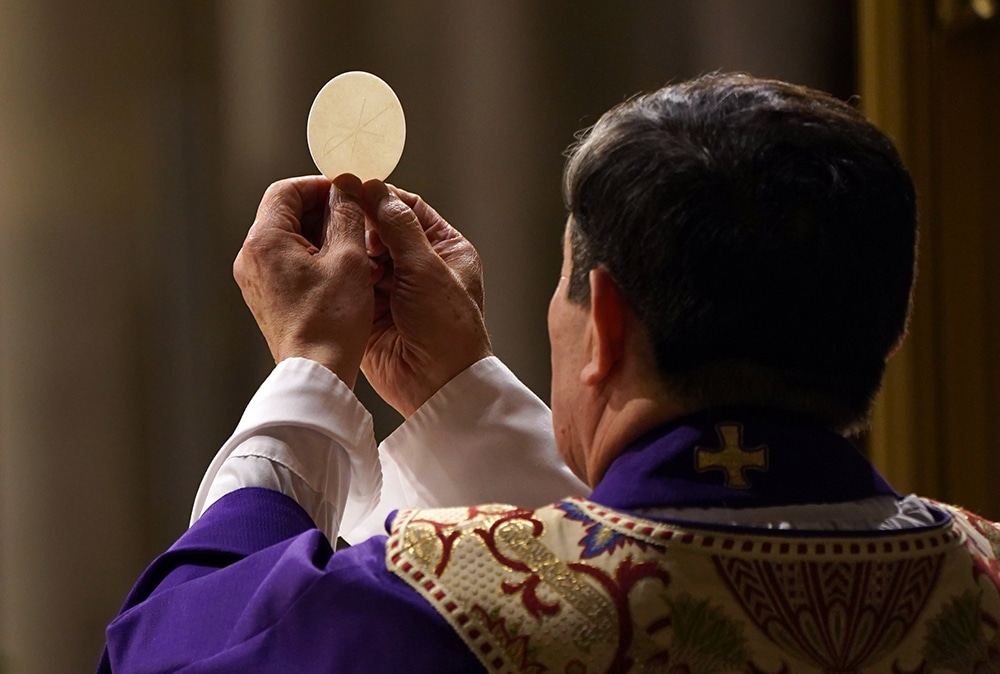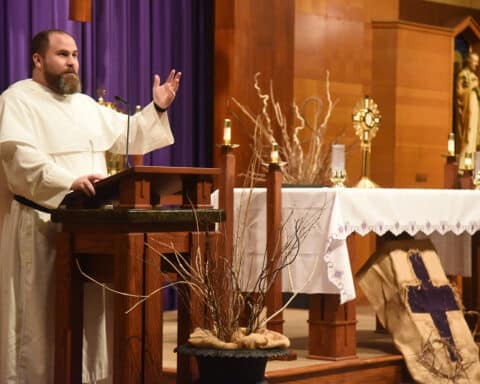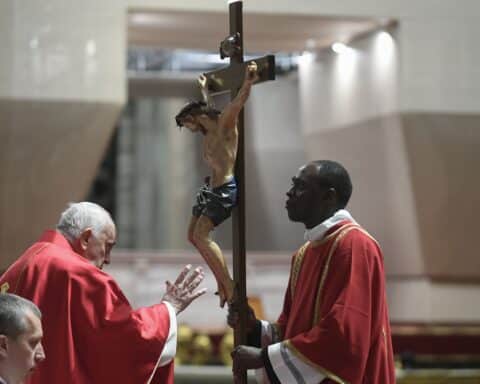“Is it inevitable that we will become an ex-Christian society, or could the Church experience a renewal?” asks pastor and noted apologist Timothy Keller in a recent thought-provoking article in the Atlantic. Keller, a Protestant minister who became pastor of Redeemer Presbyterian Church in New York City, has grown Sunday attendance from 50 churchgoers when he began in 1989 to more than 5,000 weekly attendees today.
In the Atlantic, Keller outlines a five-point plan for revival. According to him, Christians in the U.S. must relearn to communicate effectively with nonbelievers, unite righteousness with justice, embrace the global character of Christianity, balance tradition with innovation, and offer transcendence to the fragile modern self. Catholics can and should take Keller’s ideas seriously, particularly because they sing in concert with the goals of our bishops for our own Eucharistic Revival.
To date, for many Catholics, the Eucharistic Revival remains only an idea or a concept. And that is to be expected, since Phase I of the revival has been directed at clergy and diocesan leaders. Our parishioners may have heard news about the revival, but it has yet to touch their parishes. As we prepare on Corpus Christi to enter the parish phase, Lent offers the perfect opportunity for Keller’s reflection. This year, we should take to heart his ideas and use them to strive to keep the Eucharist at the center of our Lenten journey.
First, how do we communicate with non-Catholics (or poorly catechized and now nonpracticing Catholics)? Are materials and devotionals readily available for Catholics and non-Catholics to follow the Order of Mass or to participate in Eucharistic devotions like exposition and adoration? Do priests and parish leaders explain that time with the Eucharist is time with the Lord? Is our invitation accessible and inspiring?
Second, do we witness to the Gospel’s call to conversion? Keller points out that African American pastors often hold righteousness (traditional biblical sexual morality) boldly in tension with the pursuit of social justice, in all its forms, while many Protestant churches in the U.S. choose one or the other. Lent is a time of repentance, when each of us should examine our conscience before our Eucharistic Lord. Each of us should ask, does the Eucharist inspire my efforts as a parishioner?
Third, as Catholics, we have a unique opportunity to welcome and join in global traditions such as the Seven Churches pilgrimage on Holy Thursday, Holy Week processions hosted by Latino communities or organizing a Holy Saturday blessing of Easter baskets. The relationships fostered by promoting these expressions of faith can be further fed by working together to plan a Corpus Christi procession and celebration to welcome the parish phase.
Fourth, Keller urges that for a revival, the church in the U.S. must strike a balance between “innovation and conservation.” To that end, Catholics should not hesitate to study the theology of the Eucharist, to learn about different devotions from the past and find ways to integrate those expressions of faith in contemporary parish life. Reading a Church document or book on the Eucharist might inspire a new proposal for a community.
Finally, the fragile state of the modern self means that people are looking to ground their identity. The process of constantly recreating oneself is exhausting, and the Gospel offers respite and solace. For Catholics everywhere, Lent is a good time to recommit to Christ as the source of our identity and to dedicate time to him. To do so, we should consider setting aside a time for prayer, perhaps a weekly Holy Hour or coming early to Mass to have 15 or so minutes to pray before the tabernacle.
Keller’s call for the revival of American Christianity should not fall on deaf Catholic ears. “Why now?” asks the Eucharistic Revival website. “Because the Church needs healing and the world needs the Church.” As we prepare to promote new initiatives during the parish phase of the Eucharistic Revival, we should approach our pastors and offer our time and talents to establish committees and inaugurate local efforts to renew Eucharistic devotion in our parish communities.
We should take note of and embrace Keller’s call to intentionally reach out to non-Christians. Before the Eucharist, we ought to examine whether we are living the full teaching of the Gospel or preferring either justice or righteousness. We can foster joyful, multiethnic expressions of faith, embracing their fundamental Catholic sense. We should be innovative, working to bring our traditions to new light in the modern world. And finally, we should neither fear nor tremble, confident that the Gospel alone will bring life to today’s wounded and weary souls.
Our Sunday Visitor Editorial Board: Father Patrick Briscoe, Gretchen R. Crowe, Scott P. Richert, Scott Warden, York Young





